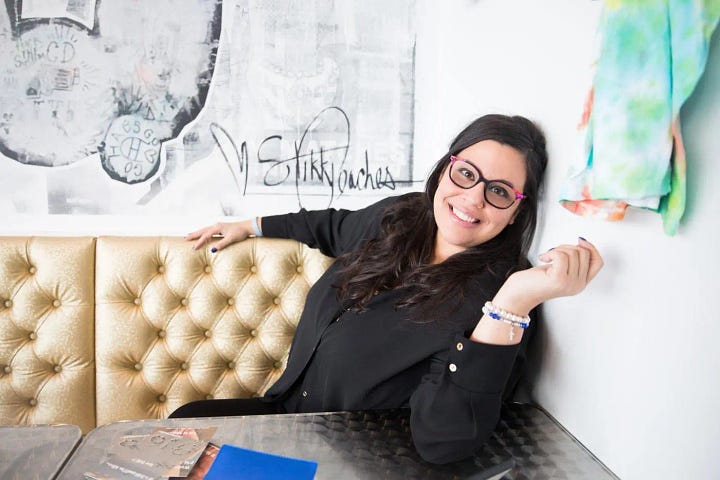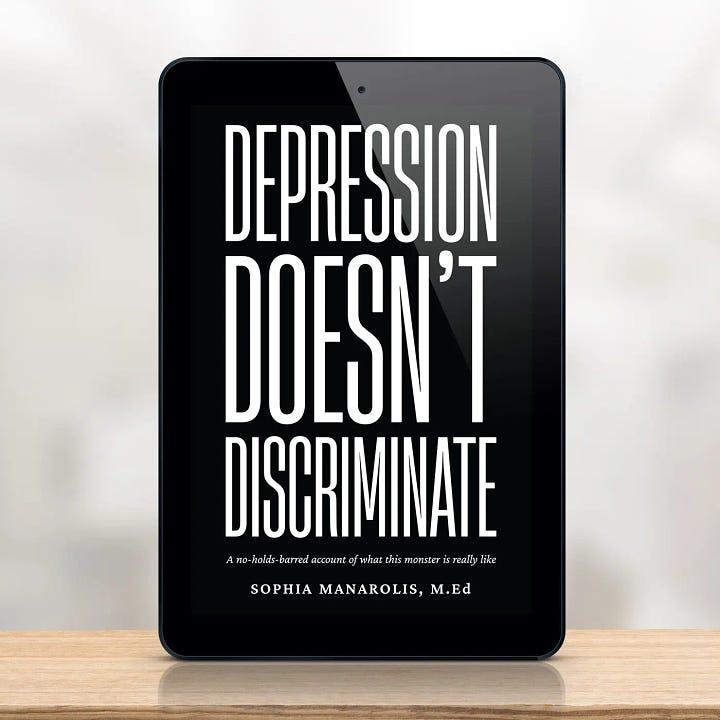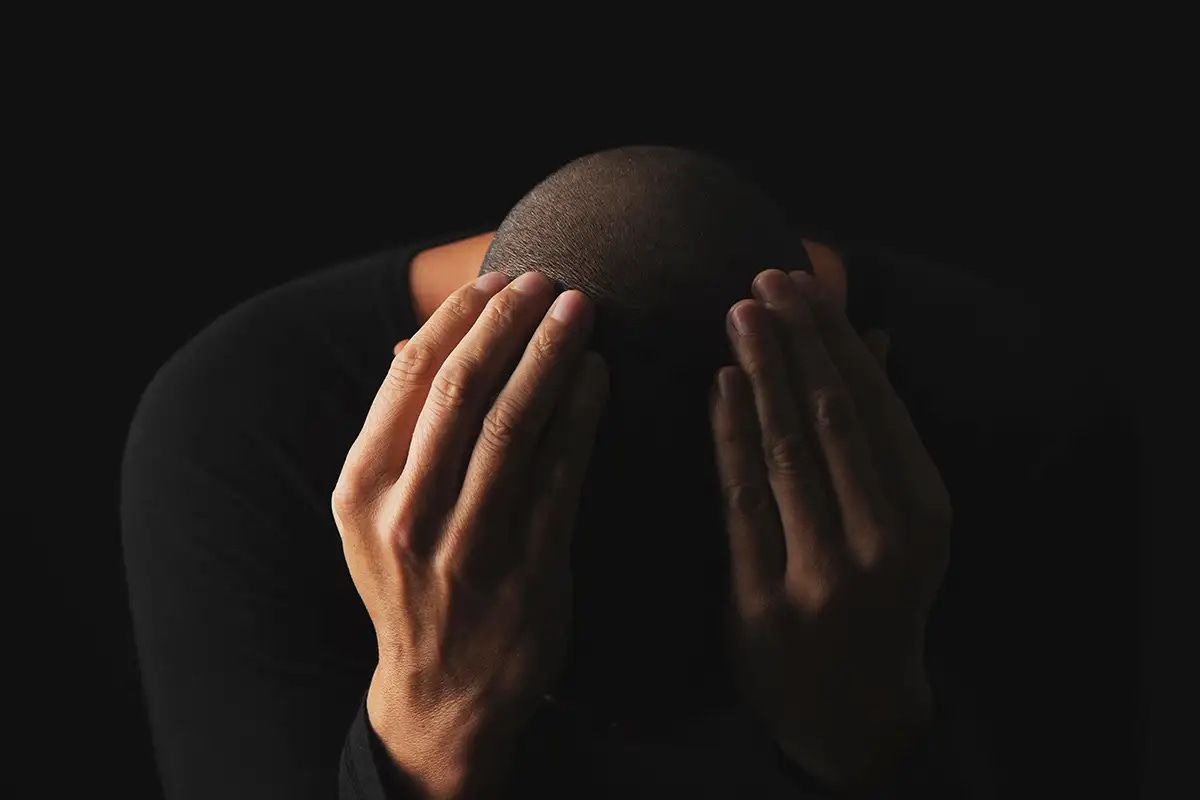Do You Have Family Members and Friends Who Are Suffering From Depression?
Here’s Why You Should Read This Book
Throughout my life, I’ve somehow been able to elude depression. This is not to say that there haven’t been moments where I’ve avoided circling the drain as a result of a life triggering experience. But what’s true about me are the number of moderately to severely depressed people I encounter on a regular basis that at times I struggle to relate to.
So how is it that I know they’re struggling with depression? Because they often tell me, suicidal thoughts and attempts included. Needless to say, this is daunting for a person like myself who may struggle to relate when confronted with the lived experiences of others.
In my phone call to Greece with Sophia Manarolis, author of “Depression Doesn’t Discriminate” she was quick to set the record straight on who her eye-opening memoir is directed towards:
Someone who DOESN'T have any form of depression yet seeks to understand some of the dynamics behind it
Someone who genuinely cares deeply for others struggling with depression and wants to understand how to better support them.
Someone who is experiencing guilt or regret from the loss of a loved to depression or suicide.
Someone who may currently be living with depression and who is in need of a little (or a lot) of encouragement and hope.
Someone seeking to help normalize the conversation around depression in the hopes of saving more precious lives.
As she notes, the content of "Depression Doesn’t Discriminate" is for informational purposes only and is not intended to diagnose, treat, or cure any condition or disease. Says Manarolis:
“This is a vivid, raw and unfiltered recounting of my personal experiences with depression, including some graphic details about some of my attempts to end my own life.”
Not for the faint of heart, Manarolis with raw vulnerability offers readers access into the deep recesses of her journey and struggles. Today, as a major depression and suicide attempt surviver, she is a professional mental health strategist on a passionate quest to help others transcend their challenges and feel alive again.
A little about you, your life trajectory, and origin story
SM: I was born in 1983 in Montreal, Canada and raised pretty Greek throughout my life. From attending Greek Saturday school all the way through grade 12; to Sunday dance practices which eventually turned into dance parties 2-3 times a week; to speaking Greek, eating Greek and breathing Greek. My parents were Greek immigrants who came to Canada in the late 60s/early 70s and worked really hard to start their own businesses. This led them to work even harder as a result of having started them.
So there was an entrepreneurial spirit deeply embedded in your upbringing?
SM: For sure. Because the entrepreneurial spirit runs deep in my family, hard work, dedication and self-sacrifice is what I was exposed to all my life. I would say that it definitely has its pros, but also hits cons.
What about your education and formative life journey?
SM: I went to primary school, high school and senior high in French, ultimately making me trilingual. I grew up in my parent's restaurant, and found myself thriving in such environments. Although my work today has nothing to do with the restaurant world, I fell in love with someone who eventually became a chef and who I am beyond fortunate enough to have married. My husband's passion still keeps me involved in restaurant life, which I am pretty grateful for as it allows me to pursue my passion of helping people in their personal growth journeys without feeling like I'm missing out on something!
So you decided to pursue a different route professionally?
SM: I sure did. I pursued my undergraduate studies in Psychology at McGill University, after having first withdrawn from my studies in Political Science during my first semester when the first major depressive episode happened. I went on to complete my Master's degree in Counseling Psychology at the University of Ottawa, where I had the second depressive episode just before the last semester of this amazing two year program. The third episode happened just after finishing my Masters in Counseling.
How did your life evolve from there?
SM: My experiences led me to launch the I'M ALIVE Movement in 2019, to help prevent as many people as possible on the planet from ever having to experience burnout, depression and suicide, and to help normalize the conversation surrounding all of that so that no one suffers in silence ever again! My husband and I now live on the wonderful island of Crete in Greece, which is where my dad was born.


What was the major catalyst behind your decision to write the book “Depression Doesn’t Discriminate?” What is its primary theme?
SM: The original major catalyst behind my decision to write this book was the response I got from the public when I opened up about my first suicide attempt that took place on 3/16 of 2011 (what I now call 3:16 Day)!
Lots of people thanked me in private, for speaking up about this monster because they were too afraid to do so themselves given the stigma that has been out there for some time. They encouraged me to continue doing what I was doing, as it brought hope to a lot more people than I realized. That was the original catalyst and although I was burning out and headed for a 4th major depressive episode, I sat there and wrote the outline for the book at the end of June of 2017, with every intent to start writing in July of that year, not realizing that I needed rest more than anything first.
So what happened?
SM: A couple weeks later, I experienced a new episode of depression which lasted 13 brutal months. Upon recovering, I entered a caregiver role as my dad was diagnosed with stage 4 prostate cancer with bone metastasis. I didn't put much thought into the movement I had started prior to that last depressive episode and if anything I felt a lot of guilt for having gone through yet another episode while teaching people to protect their mental health.
Honesty I thought my counseling and coaching days were over and that I would instead focus on sales and social media strategy for our family business. A couple months after that, my good friend's sister died by suicide. I really wanted to help her and really believed that I could, especially after I saw how much she connected with me feeling that she had finally found someone who understood her. After her passing, I realized how little people really understand about depression or suicide, unless they had lived it themselves. I then vowed to bring more h.o.p.e (help open people's eyes) to humanity by sharing my story one live stream at a time, one post at a time, one chapter at a time, one book at a time, so that no one would ever have to suffer in silence ever again.
Her death was the most recent major catalyst to write the book. It took me a couple years to get to writing it, as I relocated from Canada to an island in Greece at the beginning of the pandemic, August 1st of 2020. After some back and forth dealing with my father's illness, I finally achieved some stability around July of 2022 and began writing. Along the way the book began developing into a series! I finished writing book one on October 26th, and have just recently started writing book two.
You have mentioned that your book, while of value to depression sufferers, is primarily geared toward those of us who have friends and family dealing with this condition . Can you share a little about your decision to approach the book’s narrative in this way?
SM: I would say that the book is primarily geared toward people who have never experienced depression themselves. It is secondarily geared toward those who have friends and family dealing with this condition, which are also very often people who have not experienced depression themselves.
My parents and brother had never experienced depression, and as is described in the beginning of the first book, they did not react very well when I had the first of four major depressive episodes in my life at age 18, which was in 2002. They also had a difficult time approaching me and this condition the second time I experienced it in 2010. By the 3rd episode in 2011, they were more equipped, although then they had to deal with my having had a suicide attempt as well.
What are some of the common challenges experienced by those of us who have family members and friends who are struggling with depression?
SM: Too many people fear saying the wrong thing and oftentimes choose to say nothing, which can make things worse on many levels. Or they say things that would perhaps be helpful in conversation with someone struggling from something else in their lives, but not at all helpful to someone suffering from depression.
We were not taught what to say or do in moments like this, nor were we taught what to say or do when someone expresses suicidal thinking. CPR and CPR certifications are made available to many folks, not just ones working in first responder roles. It would be beneficial if folks from all walks of life also got suicide prevention training.
I offer somewhat of an introduction to this and other helpful tips on how to approach someone struggling with depression in the book. I also provide wonderful examples of how one could demonstrate empathy, care, and love in ways that will be better received by someone struggling with depression.
Can you offer a brief taste of what part two of your book will explore?
SM: Part two will take a look at the last depressive episode I experienced, which was longer and more brutal than the first three I encountered. It will also include interviews with others who have been a caregiver for someone with depression or are in the process of doing so (what it's like for them and how they cope).
I’ll also include interviews with folks who have lost someone to suicide and how they have dealt with such a difficult loss and continue to deal with such complicated grief. The book will also look at alternative forms of treatment that have helped me heal since writing part 1, where a lot of unhealed trauma surfaced for me! I want people to know what else is out there beyond the traditional forms of treating depression that are often not helpful to many.
Part two also looks at how people can integrate more gratitude into their daily lives as a form of preventing burnout and depression, and how they can help grow this movement of normalizing the conversation so that no one suffers in silence ever again!
What do you believe is the biggest misconceptions being bantered around these days with respect to depressive episodes and suicidal events?
SM: The biggest misconceptions I’ve noticed is the belief that people who are suicidal actually want to die. With respect to depression, people who are suicidal are usually in extreme emotional pain and they want that pain to end, not their lives. This monster could be so debilitating, and so deceiving in that it convinces us that suicide really is the only way at that point.
Also, the worst of them all and the one that triggered me very much after my friend’s sister died by suicide, is that it is a selfish act. Most often, those who are considering ending their lives, are often convinced that their loved ones would be better off without them. The monster manages to persuade us that we are a burden to others, especially our family members, and that we would be doing them a favor really. Imagine that.
As for depression itself, the biggest misconception is about who it can happen to. Like the title of my book says, Depression DOESN’T Discriminate, and this unseen monster can happen to anyone, no matter your age, gender, sex, race, religion, ethnicity or financial status…to ANYONE.
In what ways do you believe your book can spark fresh opportunities for thoughtful, informed conversations about depression as well as encouragement and support?
SM: I believe my book can encourage folks who have suffered from depression to come out and speak about it so that we can normalize the conversation to a point of no return! More people talking about it openly can lead to more of us getting the support we need sooner rather than later, so that we can recover from this beast sooner rather than later. I also believe it can help those caregiving for someone with depression get the help they need themselves, as caregiver burnout and depression is very real.
How have books served as a vehicle for your own personal growth and development?
SM: Reading stories of others who have overcome challenges or achieved success has provided me with inspiration and motivation for my own journey! My favorite book of all time is "Life's Golden Ticket" by Brendon Burchard.
What is the biggest piece of insight or perspective you are hoping readers will walk away with from your book?
SM: That depression can happen to anyone, no matter how well life appears to be going, and that self-love is an ongoing conscious choice they can make to ensure it doesn't happen to them. I would love for my readers to invest in learning to love themselves as though their life depends on it. Because in actuality it does.
A Note From Diamond-Michael Scott:
“Great Books, Great Minds” is my full-time work and life passion, a labor of love fueled by the endless hours of work I put into researching and writing these feature pieces. So if you enjoy this digital newsletter, find it valuable, and savor world-class book experiences featuring epic authors and book evangelists, then please consider becoming a paid supporting member at $6.00 a month or $60.00/year.





